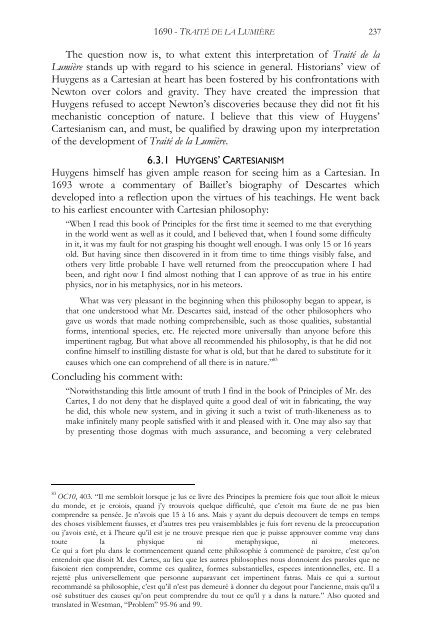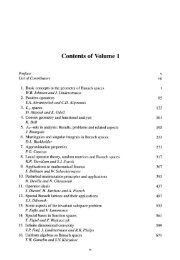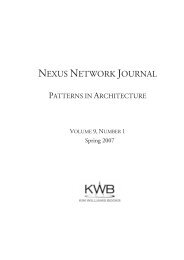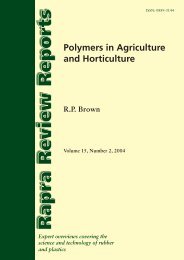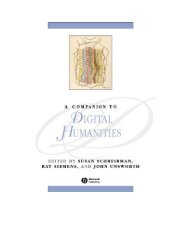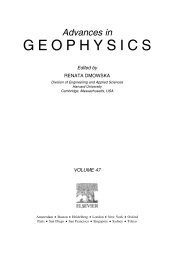Lenses and Waves
Lenses and Waves
Lenses and Waves
You also want an ePaper? Increase the reach of your titles
YUMPU automatically turns print PDFs into web optimized ePapers that Google loves.
1690 - TRAITÉ DE LA LUMIÈRE 237<br />
The question now is, to what extent this interpretation of Traité de la<br />
Lumière st<strong>and</strong>s up with regard to his science in general. Historians’ view of<br />
Huygens as a Cartesian at heart has been fostered by his confrontations with<br />
Newton over colors <strong>and</strong> gravity. They have created the impression that<br />
Huygens refused to accept Newton’s discoveries because they did not fit his<br />
mechanistic conception of nature. I believe that this view of Huygens’<br />
Cartesianism can, <strong>and</strong> must, be qualified by drawing upon my interpretation<br />
of the development of Traité de la Lumière.<br />
6.3.1 HUYGENS’CARTESIANISM<br />
Huygens himself has given ample reason for seeing him as a Cartesian. In<br />
1693 wrote a commentary of Baillet’s biography of Descartes which<br />
developed into a reflection upon the virtues of his teachings. He went back<br />
to his earliest encounter with Cartesian philosophy:<br />
“When I read this book of Principles for the first time it seemed to me that everything<br />
in the world went as well as it could, <strong>and</strong> I believed that, when I found some difficulty<br />
in it, it was my fault for not grasping his thought well enough. I was only 15 or 16 years<br />
old. But having since then discovered in it from time to time things visibly false, <strong>and</strong><br />
others very little probable I have well returned from the preoccupation where I had<br />
been, <strong>and</strong> right now I find almost nothing that I can approve of as true in his entire<br />
physics, nor in his metaphysics, nor in his meteors.<br />
What was very pleasant in the beginning when this philosophy began to appear, is<br />
that one understood what Mr. Descartes said, instead of the other philosophers who<br />
gave us words that made nothing comprehensible, such as those qualities, substantial<br />
forms, intentional species, etc. He rejected more universally than anyone before this<br />
impertinent ragbag. But what above all recommended his philosophy, is that he did not<br />
confine himself to instilling distaste for what is old, but that he dared to substitute for it<br />
causes which one can comprehend of all there is in nature.” 83<br />
Concluding his comment with:<br />
“Notwithst<strong>and</strong>ing this little amount of truth I find in the book of Principles of Mr. des<br />
Cartes, I do not deny that he displayed quite a good deal of wit in fabricating, the way<br />
he did, this whole new system, <strong>and</strong> in giving it such a twist of truth-likeneness as to<br />
make infinitely many people satisfied with it <strong>and</strong> pleased with it. One may also say that<br />
by presenting those dogmas with much assurance, <strong>and</strong> becoming a very celebrated<br />
83 OC10, 403. “Il me sembloit lorsque je lus ce livre des Principes la premiere fois que tout alloit le mieux<br />
du monde, et je croiois, qu<strong>and</strong> j’y trouvois quelque difficultè, que c’etoit ma faute de ne pas bien<br />
comprendre sa pensée. Je n’avois que 15 à 16 ans. Mais y ayant du depuis decouvert de temps en temps<br />
des choses visiblement fausses, et d’autres tres peu vraisemblables je fuis fort revenu de la preoccupation<br />
ou j’avois estè, et à l’heure qu’il est je ne trouve presque rien que je puisse approuver comme vray dans<br />
toute la physique ni metaphysique, ni meteores.<br />
Ce qui a fort plu dans le commencement qu<strong>and</strong> cette philosophie à commencè de paroitre, c’est qu’on<br />
entendoit que disoit M. des Cartes, au lieu que les autres philosophes nous donnoient des paroles que ne<br />
faisoient rien comprendre, comme ces qualitez, formes substantielles, especes intentionnelles, etc. Il a<br />
rejettè plus universellement que personne auparavant cet impertinent fatras. Mais ce qui a surtout<br />
recomm<strong>and</strong>é sa philosophie, c’est qu’il n’est pas demeurè à donner du degout pour l’ancienne, mais qu’il a<br />
osè substituer des causes qu’on peut comprendre du tout ce qu’il y a dans la nature.” Also quoted <strong>and</strong><br />
translated in Westman, “Problem” 95-96 <strong>and</strong> 99.


